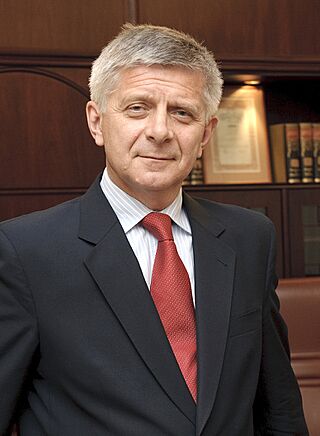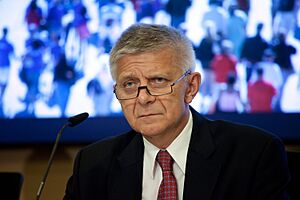Marek Belka facts for kids
Quick facts for kids
His Excellency
Marek Belka
|
|
|---|---|
|
Official portrait, 2010
|
|
| Prime Minister of Poland | |
| In office 2 May 2004 – 31 October 2005 |
|
| President | Aleksander Kwaśniewski |
| Deputy | Jerzy Hausner Izabela Jaruga-Nowacka |
| Preceded by | Leszek Miller |
| Succeeded by | Kazimierz Marcinkiewicz |
| President of the National Bank of Poland | |
| In office 11 June 2010 – 20 June 2016 |
|
| Appointed by | Bronisław Komorowski |
| Preceded by | Piotr Wiesiołek (Acting) |
| Succeeded by | Adam Glapiński |
| Member of the European Parliament | |
| In office 1 July 2019 – 15 July 2024 |
|
| Constituency | Łódź |
| Deputy Prime Minister of Poland | |
| In office 19 October 2001 – 6 July 2002 |
|
| Prime Minister | Leszek Miller |
| In office 4 February 1997 – 17 October 1997 |
|
| Prime Minister | Włodzimierz Cimoszewicz |
| Minister of Finance | |
| In office 19 October 2001 – 6 July 2002 |
|
| Prime Minister | Leszek Miller |
| Preceded by | Halina Wasilewska-Trenker |
| Succeeded by | Grzegorz Kołodko |
| In office 4 February 1997 – 17 October 1997 |
|
| Prime Minister | Włodzimierz Cimoszewicz |
| Preceded by | Grzegorz Kołodko |
| Succeeded by | Leszek Balcerowicz |
| Personal details | |
| Born |
Marek Marian Belka
9 January 1952 Łódź, Poland |
| Political party | Polish United Workers' Party (1973–1990) Democratic Left Alliance (1999–2005) Independent (1990–1999, 2005–present) |
| Other political affiliations |
Progressive Alliance of Socialists and Democrats (Since 2019) The Left (Since 2019) |
| Spouse | Krystyna Belka |
| Children | 2 |
| Education | University of Łódź |
| Awards | |
Marek Marian Belka (born 9 January 1952 in Łódź) is a Polish professor of economics and a politician. He has held many important roles in Poland and in international organizations. He served as the Prime Minister of Poland and the Finance Minister of Poland. He was also a director at the International Monetary Fund (IMF) and the Head of the National Bank of Poland. From 2019 to 2024, he was a Member of the European Parliament (MEP).
Contents
Early Life and Education
Marek Belka was born in Łódź, Poland. He studied at the University of Łódź, where he earned his master's degree and a PhD in economics. His PhD focused on how the United States tried to control inflation. He also studied at famous universities like Columbia University, University of Chicago, and the London School of Economics. In 1994, he became a professor.
He has written over 100 scientific papers about money and how to fight inflation in developing countries. He is an expert in how economics works in real life and in modern economic ideas.
Early Career and Government Roles
From 1990 to 1996, Marek Belka worked as an advisor for the Ministry of Finance and the World Bank. He also advised the President of Poland, Aleksander Kwaśniewski, on economic matters.
He served as Deputy Prime Minister of the Republic of Poland and Minister of Finance twice. First, in 1997, and then again from 2001 to 2002. He also advised the Prime Ministers of Albania between 1997 and 2001.
Later, from 2002 to 2003, he was an advisor for a large financial company called JP Morgan. In 2003, he worked in Iraq, where he helped manage economic policy. This included helping with currency reform and setting up a new banking system.
Political Career in Poland
Marek Belka was involved in student groups when he was younger. He was a member of the Polish United Workers' Party from 1973 to 1990.
In 2004, he was chosen by President Aleksander Kwaśniewski to be the Prime Minister of Poland. He took office on 2 May 2004. He needed support from the Polish Parliament, called the Sejm, to keep his position. After some attempts, he finally received enough votes on 24 October 2004. He served as Prime Minister until 2005. During this time, he also led the Committee for European Integration. In 2005, he briefly served as the Minister of Sport in his own government.
In 2005, he joined a new political party called Democratic Party - demokraci.pl. However, he did not win a seat in the Polish Parliament in the 2005 elections.
International Roles
Marek Belka has held several important roles in international organizations. From 2006 to 2008, he was the Executive Secretary of the UN Economic Commission for Europe (ECE).
In 2008, he became the Director of the European Department at the International Monetary Fund (IMF). In this role, he helped lead the IMF's efforts to deal with the global economic crisis in Europe.
President of the National Bank of Poland
On 27 May 2010, Marek Belka was nominated to be the next President of the National Bank of Poland. The Polish Parliament approved his nomination on 10 June 2010. He started his term on 11 June 2010 and finished on 20 June 2016.
During his time as head of the National Bank, he was also elected to the Steering Committee of the European Systemic Risk Board. This group helps watch for risks in Europe's financial system.
In 2014, some secret recordings involving Polish government officials were published. In one of these, Mr. Belka discussed the upcoming 2015 election. He stated that he would not resign because of these remarks.
Member of the European Parliament
In the 2019 European Parliament election, Marek Belka was elected as a Member of the European Parliament (MEP) for the Łódź region. As an MEP, he worked on the Committee on Economic and Monetary Affairs. He also joined the Subcommittee on Tax Matters in 2020. He was a member of the delegation that works on relations with the United States. His term as an MEP ended on 15 July 2024. He ran for re-election in 2024 but was not re-elected.
Later Career
In 2025, the European Commission chose Marek Belka to lead the audit board for its Ukraine Facility. This facility helps Ukraine with financial support.
Other Activities
Marek Belka has been involved in many other important groups and organizations.
International Organizations
- European Investment Bank (EIB), Member of the Appointment Advisory Committee (since 2017)
- European Systemic Risk Board (ESRB), Member of the Steering Committee (2011-2016)
- European Bank for Reconstruction and Development (EBRD), Member of the Board of Governors (2010-2016)
- Joint World Bank-IMF Development Committee, Chairman (2011-2015)
Corporate Boards
- Echo Polska Properties, Independent Member of the Board of Directors (since 2016)
- Bank Millennium, Member of the Supervisory Board (2002-2004)
- LOT Polish Airlines, Chairman of the Board of Directors (2002-2003)
Non-profit Organizations
- Berggruen Institute, Member of the Council for the Future of Europe
- Trilateral Commission, Member of the European Group
- Polish-American Freedom Foundation, Member of the Board of Directors (2000-2010)
Recognition
Marek Belka has received special honors for his work. In 2006, he received an Honorary Doctorate from Heriot-Watt University. He is also an Honorary Member of the International Raoul Wallenberg Foundation. In 2013, he was added to the Polish Economy Hall of Fame.
Personal Life
Marek Belka is married to Krystyna Belka. They have two children. The family lives in Łódź.
Images for kids
See also
 In Spanish: Marek Belka para niños
In Spanish: Marek Belka para niños
 | Janet Taylor Pickett |
 | Synthia Saint James |
 | Howardena Pindell |
 | Faith Ringgold |




